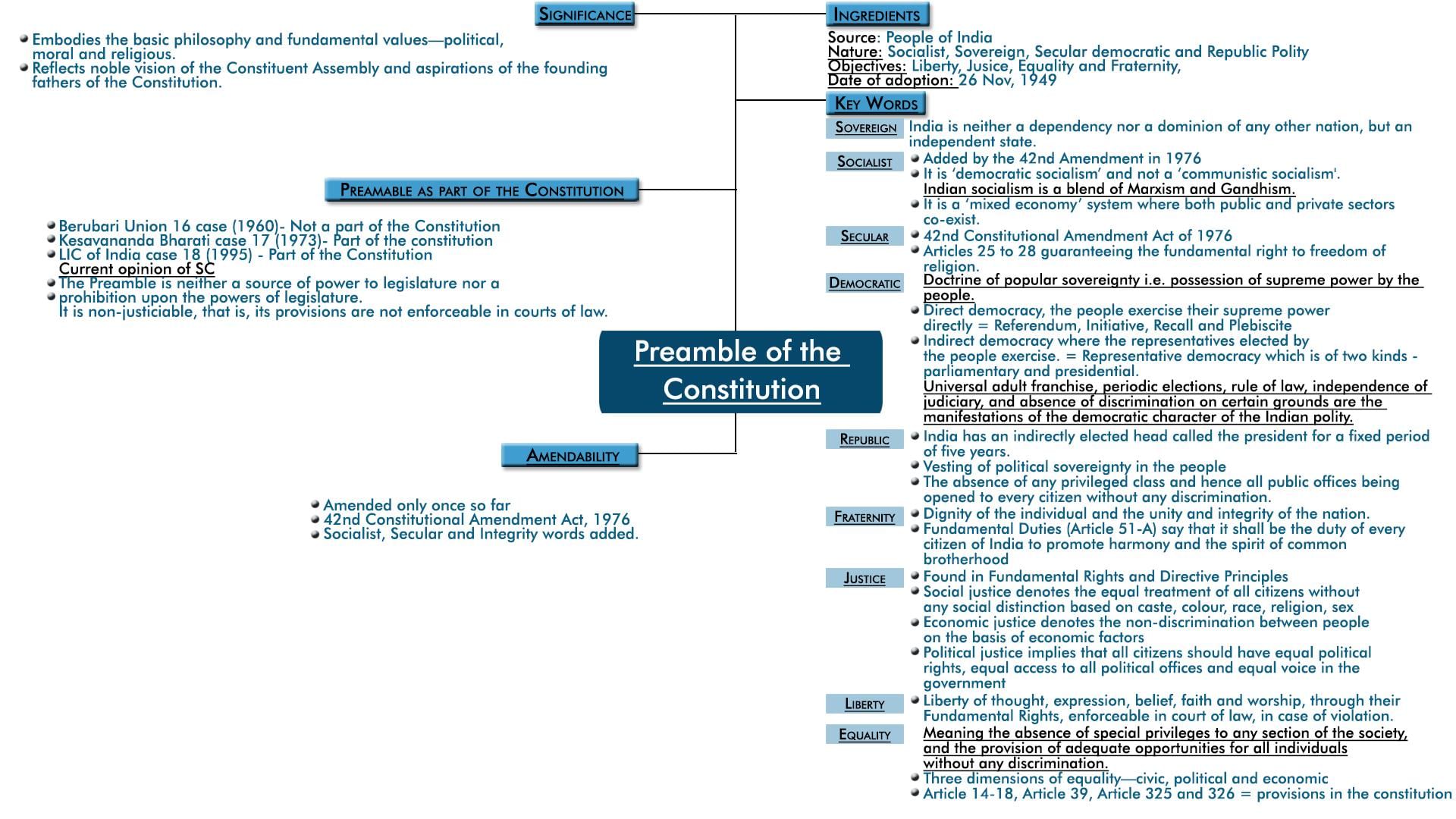Mind Map: Preamble of the Constitution | Indian Polity for UPSC CSE PDF Download
 1. Ingredients
1. Ingredients
(a) Source: People of India
(b) Nature: Socialist, Sovereign, Secular democratic and Republic Polity
(c) Objectives: Liberty, Justice, Equality and Fraternity,
(d) Date of adoption: 26 Nov, 1949
2. Key Words
(a) Sovereign
(i) India is neither a dependency nor a dominion of any other nation, but an independent state.
(b) Socialist
(i) Added by the 42nd Amendment in 1976
(ii) It is ‘democratic socialism’ and not a ‘communistic socialism'.
(iii) Indian socialism is a blend of Marxism and Gandhism.
- It is a ‘mixed economy’ system where both public and private sectors co-exist.
(c) Secular
(i) 42nd Constitutional Amendment Act of 1976
- Articles 25 to 28 guaranteeing the fundamental right to freedom of religion.
(d) Democratic
(i) Doctrine of popular sovereignty i.e. possession of supreme power by the people.
- Direct democracy, the people exercise their supreme power directly = Referendum, Initiative, Recall and Plebiscite
- Indirect democracy where the representatives elected by the people exercise = Representative democracy which is of two kinds -parliamentary and presidential.
(ii) Universal adult franchise, periodic elections, rule of law, independence of judiciary, and absence of discrimination on certain grounds are the manifestations of the democratic character of the Indian polity.
(e) Republic
(i) India has an indirectly elected head called the president for a fixed period of five years.
(ii) Vesting of political sovereignty in the people
- The absence of any privileged class and hence all public offices being opened to every citizen without any discrimination
(f) Fraternity
(i) Dignity of the individual and the unity and integrity of the nation.
- Fundamental Duties (Article 51- A) say that it shall be the duty of every citizen of India to promote harmony and the spirit of common brotherhood
(g) Justice
(i) Found in Fundamental Rights and Directive Principles
- Social justice denotes the equal treatment of all citizens without any social distinction based on caste, colour, race, religion, sex a
- Economic justice denotes the non-discrimination between people on the basis of economic factors
- Political justice implies that all citizens should have equal political rights, equal access to all political offices and equal voice in the government
(h) Liberty
(i) Liberty of thought, expression, belief, faith and worship, through their Fundamental Rights, enforceable in court of law, in case of violation.
(i) Equality
(i) Meaning the absence of special privileges to any section of the society, and the provision of adequate opportunities for all individuals without any discrimination.
- Three dimensions of equality—civic, political and economic
- Article 14-18, Article 39, Article 325 and 326 = provisions in the constitution
3. Significance
(a) Embodies the basic philosophy and fundamental values—political, moral and religious.
(i) Reflects noble vision of the Constituent Assembly and aspirations of the founding fathers of the Constitution.
4. Preamble as part of the Constitution
(a) Berubari Union 16 case (1960) - Not a part of the Constitution
(b) Kesavananda Bharati case 17 (1973) - Part of the constitution
(c) LIC of India case 18 (1995) - Part of the Constitution
(d) Current opinion of SC
(i) The Preamble is neither a source of power to legislature nor a prohibition upon the powers of legislature.
(ii) It is non-justiciable, that is, its provisions are not enforceable in courts of law.
5. Amendability
(a) Amended only once so far
(i) 42nd Constitutional Amendment Act, 1976
(ii) Socialist, Secular and Integrity words added.
|
147 videos|780 docs|202 tests
|
FAQs on Mind Map: Preamble of the Constitution - Indian Polity for UPSC CSE
| 1. What is the Preamble of the Constitution? |  |
| 2. What is the purpose of the Preamble? |  |
| 3. What are the key elements mentioned in the Preamble of the Constitution? |  |
| 4. Is the Preamble legally binding? |  |
| 5. Can the Preamble be amended? |  |






















